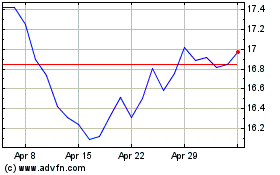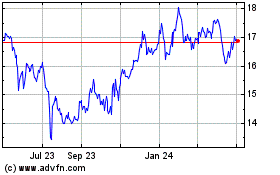By John D. McKinnon
This article is being republished as part of our daily
reproduction of WSJ.com articles that also appeared in the U.S.
print edition of The Wall Street Journal (November 24, 2017).
WASHINGTON -- Over just two days this week, the Trump
administration has both sued AT&T Inc. to block its planned
takeover of Time Warner Inc. and proposed allowing internet-service
providers -- like AT&T -- to form closer alliances with content
companies, like Time Warner.
The two government moves seem to go in opposite directions, on
the one hand restricting a major telecommunications merger and on
the other giving internet providers broad new powers to shape their
customers' online experiences.
But the actions reveal one consistency, and what might be viewed
as an emerging Trump administration regulatory philosophy: Instead
of new bright-line rules, such as those put in place under the
Obama administration, it is stressing the enforcement of
longstanding laws and regulations.
The moves are a shift in emphasis from the approach taken by the
Obama administration, which in 2015 adopted highly specific rules
governing internet providers in the name of "net neutrality," the
principle that all web traffic be treated equally. The providers
were prevented from cutting deals, known as "paid prioritization,"
that would give fast lanes to some kinds of content in return for a
price.
And the Obama administration carried that approach into the
antitrust realm, insisting in Comcast Corp.'s acquisition of
NBCUniversal, Inc. earlier this decade that Comcast live up to
elaborate net-neutrality restrictions, as part of the so-called
behavioral remedies that were conditions of antitrust approval.
In other words, net-neutrality regulation took the place of an
antitrust challenge.
Now the tables are turned. When it comes to internet policing,
the FCC will ease back on its rules and turn a measure of oversight
authority to the antitrust cop, the Federal Trade Commission, a
deliberate action outlined Tuesday by FCC Chairman Ajit Pai.
"As a result of my proposal, the Federal Trade Commission will
once again be able to police [internet providers], protect
consumers and promote competition, just as it did before 2015," Mr.
Pai said. "Notably, my proposal will put the federal government's
most experienced privacy cop, the FTC, back on the beat to protect
consumers' online privacy."
In the case of net neutrality, Mr. Pai's FCC moved fairly
quickly by regulatory standards. It is too soon to know whether
this enforcement emphasis will extend to other parts of the Trump
deregulatory agenda, which involves rolling back a broad range of
Obama-era rules covering power-plant emissions, financial services
and other industries.
In the financial sector, Mr. Trump's regulatory team has
launched a review of stricter rules adopted after the 2008
bailouts. In general, officials say they want to recalibrate
standards governing bank lending and other areas without scrapping
them entirely.
It isn't clear whether financial regulators will maintain the
streak of aggressive enforcement actions that began under the Obama
administration. Fines levied by the Securities and Exchange
Commission fell to a four-year low in the last fiscal year, though
SEC officials caution against reading too much into a single year's
data.
At the Environmental Protection Agency, Administrator Scott
Pruitt has touted a "back-to-basics" approach involving the
reversal of numerous Obama regulations and has said he would
emphasize enforcement.
"There's a difference between creating regulatory certainty and
holding polluters accountable for violating environmental laws,"
said EPA spokeswoman Liz Bowman.
Environmental groups say the EPA's actions so far this year
don't suggest a robust emphasis on enforcement. The agency counters
that those groups' estimates are low because it can take months or
years before such an action can be completed.
Consumer groups argue that clear regulations are necessary
across industries to keep companies from harming consumers. With
the internet, they say, antitrust enforcement is too cumbersome,
slow and potentially arbitrary to keep up with the speed of
technological change.
Because the FTC doesn't have the authority to create and enforce
broad rules, it isn't in a position to police fast and slow lanes
that may harm competition, said Jonathan Zittrain, professor of law
and computer science at Harvard University and a former chairman of
the FCC's Open Internet Advisory Committee. The agency can only
take "individual enforcement action on the vague notion of unfair
trade practices," he said.
Conservatives who believe in a lighter-touch regulation, like
Mr. Pai, generally argue that hard-and-fast regulatory rules are
overly prescriptive and will slow investment and innovation.
Some free-market advocates take that even further, saying the
antitrust action this week goes too far, especially given that the
AT&T-Time Warner tie-up is a "vertical" merger, or one that
combines two companies that operate at different stages of a supply
chain.
"If this one [transaction] isn't good, what vertical integration
transaction is going to be good? Virtually none," said Fred
Campbell, director of Tech Knowledge, a free-market think tank and
a former head of the FCC's wireless bureau about a decade ago.
"Isn't it a de facto regulation then that we're just going to
prohibit vertical integration?"
--
Douglas MacMillan
, Ryan Knutson, Ryan Tracy and Timothy Puko contributed to this
article.
Write to John D. McKinnon at john.mckinnon@wsj.com
(END) Dow Jones Newswires
November 24, 2017 02:47 ET (07:47 GMT)
Copyright (c) 2017 Dow Jones & Company, Inc.
AT&T (NYSE:T)
Historical Stock Chart
From Mar 2024 to Apr 2024

AT&T (NYSE:T)
Historical Stock Chart
From Apr 2023 to Apr 2024
